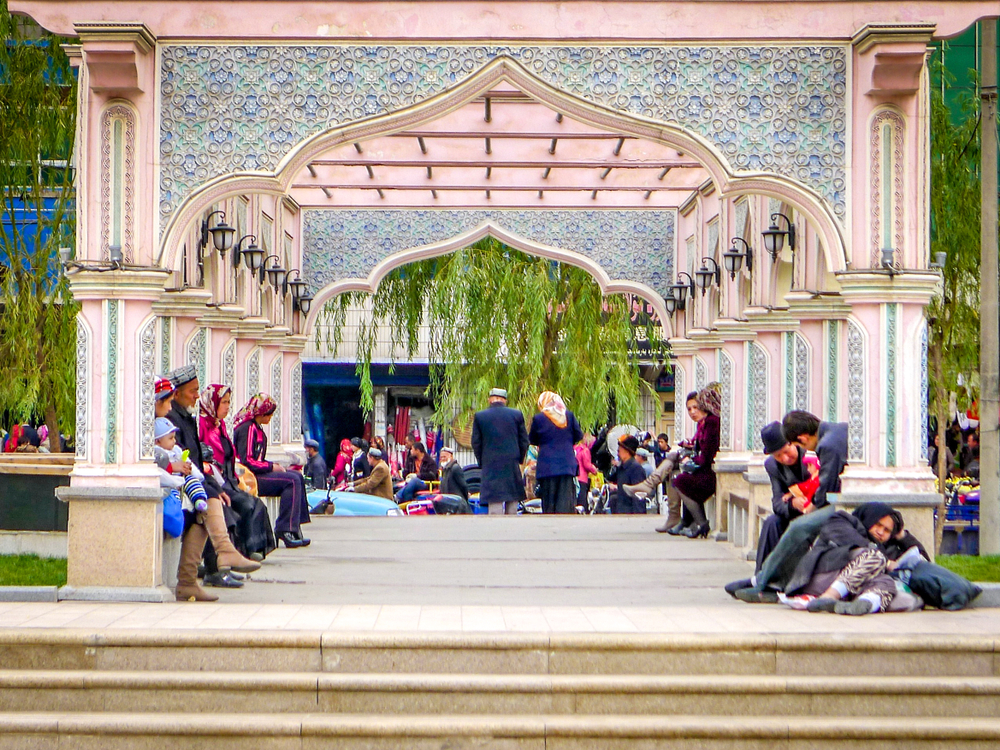by JAMES M. DORSEY
 Uyghurs in a market in Kashgar, Xinjiang PHOTO/Kylie Nicholson/Shutterstock.com
Uyghurs in a market in Kashgar, Xinjiang PHOTO/Kylie Nicholson/Shutterstock.com
A seemingly obsessive fear of Uyghur nationalist and religious sentiment has prompted Chinese leaders to contemplate military involvement in Syria and Afghanistan and risk international condemnation for its massive repression in its north-western province of Xinjiang, involving the most frontal assault on Islam as a faith in recent history.
Chinese fears of Uyghur activism threaten to become a self-fulfilling prophecy. Its policies are likely to prompt jihadists, including Uyghur foreign fighters in Syria and Iraq, some of whom are exploring new pastures in Central Asia closer to China’s borders, to put the People’s Republic further up their target list.
Up to 5,000 Uyghurs are believed to have joined jihadist groups in Syria and Iraq in recent years, including the Islamic State, whose leader, Abu Bakr Al Baghdadi, listed Xinjiang in 2014 at the top of his list of countries that violate Muslim rights.
Uyghur fighters speaking in videos distributed by the Islamic State have vowed to return home to “plant their flag in China.” One fighter, addressing evil Chinese Communist infidel lackeys,” threatened that “in retaliation for the tears that flow from the eyes of the oppressed, we will make your blood flow in rivers, by the will of God.”
Maps circulating on Twitter purporting to highlight the Islamic State’s expansion plans included substantial parts of Xinjiang. Al Qaeda echoed the Islamic State’s statements by condemning Chinese policy towards Xinjiang as “’occupied Muslim land’ to be “recovered (into) the shade of the Islamic Caliphate.”
China’s concerns of a jihadist backlash go beyond fears of political violence. They are driven to a large extent by the fact that Xinjiang is home to 15 percent of China’s proven oil reserves, 22 per cent of its gas reserves, and 115 of the 147 raw materials found in the People’s Republic as well as part of its nuclear arsenal.
Yasheng Sidike, the mayor of the Xinjiang capital of Urumqi and city’s deputy Communist Party chief, in a signal of what re-education means in camps in which, according to the United Nations, up to one million Uyghurs, a Turkic minority, and other Muslims have been detained, recently argued that Uyghurs were “members of the Chinese family, not descendants of the Turks.”
Sidike went on to say that “the three evil forces, using the name of ethnics and religion, have been creating hatred between ethnic groups and the mania to conduct terrorist activities, which greatly damage the shared interests of Xinjiang people.” Sidike was referring to China’s portrayal of terrorism, separatism and religious extremism as three evils.
The Communist Party’s Global Times asserted earlier that the security situation in Xinjiang had been “turned around and terror threats spreading from there to other provinces of China are also being eliminated. Peaceful and stable life has been witnessed again in all of Xinjiang… Xinjiang has been salvaged from the verge of massive turmoil. It has avoided the fate of becoming ‘China’s Syria’ or ‘China’s Libya,’” the paper said.
Witness statements by former detainees of the re-education camps reported that they constituted an attempt to brainwash inmates into accepting loyalty to the Communist Party and China’s leadership above their religious beliefs.
Lobe Log for more